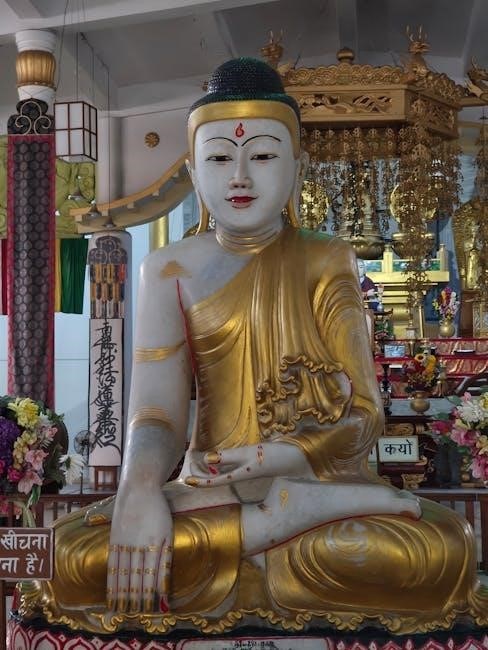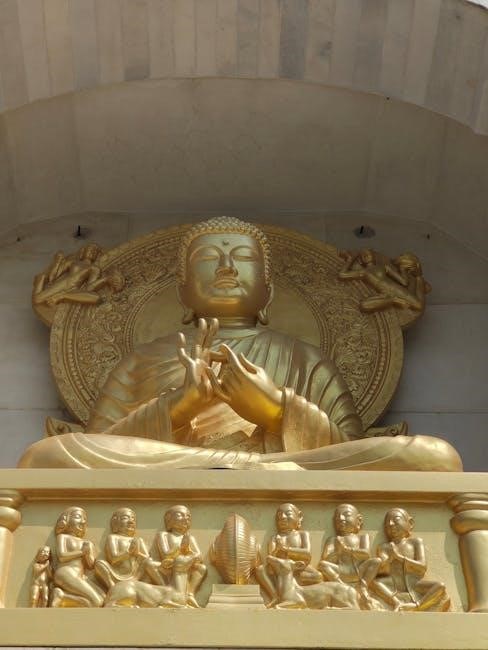when the emperor was divine pdf
When the Emperor Was Divine‚ Julie Otsuka’s debut novel‚ explores the poignant story of a Japanese American family uprooted from 1942 Berkeley‚ California‚ during WWII. The novel captures their emotional journey‚ resilience‚ and the harsh realities of internment‚ blending historical fiction with deeply personal narratives.

Historical Context of Japanese American Internment
Executive Order 9066 led to the forced relocation of over 120‚000 Japanese Americans during WWII‚ causing loss of homes‚ livelihoods‚ and rights‚ and inflicting lasting emotional trauma and racial injustice.
Setting in 1942 Berkeley‚ California

The novel is set in 1942 Berkeley‚ California‚ a quiet neighborhood where a Japanese American family lives a peaceful life until their world is shattered by the onset of World War II. The story begins in their home on a quiet street‚ where the family receives a fateful notice from the post office‚ ordering their relocation. The setting captures the stark contrast between the familiarity of their home and the harsh reality of the internment camp they are forced to inhabit. Berkeley‚ with its progressive reputation‚ serves as a poignant backdrop for the family’s sudden uprooting‚ highlighting the racial tensions and fear that permeate the era. The transition from their cozy home to the desolate Utah desert camp underscores the loss of security and identity. The setting effectively conveys the emotional and physical displacement experienced by Japanese Americans during this period‚ blending personal tragedy with historical context.
Executive Order 9066 and Its Impact
Executive Order 9066‚ issued in 1942‚ was the catalyst for the forced relocation of over 120‚000 Japanese Americans‚ including the family in When the Emperor Was Divine. This order‚ signed by President Franklin D. Roosevelt‚ authorized the military to designate areas from which individuals could be excluded‚ leading to the internment of Japanese Americans in camps across the United States. The novel vividly portrays the immediate impact of this order on the family‚ as they are classified as “enemy aliens” and forced to leave their home in Berkeley‚ California. The order resulted in the loss of homes‚ livelihoods‚ and savings‚ causing emotional trauma and a sense of betrayal. Families were uprooted‚ with many interned in harsh conditions‚ their rights stripped away. The order remains a symbol of wartime hysteria and racial discrimination‚ deeply impacting Japanese-American communities for generations.
The Family’s Journey and Struggles
The novel follows a Japanese American family’s forced relocation to an internment camp‚ capturing their emotional toll‚ loss of innocence‚ and resilience amid wartime injustices and separation.
The Mother’s Role and Resilience

The mother in When the Emperor Was Divine embodies resilience‚ guiding her family through the trauma of internment with quiet strength. Her ability to adapt and maintain hope amidst hardship underscores her role as the emotional anchor of the family. Despite the harsh conditions of the camp‚ she ensures their survival and unity‚ symbolizing the enduring power of maternal love. Her new glasses‚ a subtle yet poignant detail‚ represent her clarity of purpose‚ even as her vision of their place in America remains blurred. The mother’s resilience is not just about physical survival but also about preserving the family’s dignity and cultural identity in the face of profound injustice. Her quiet determination and unwavering commitment to her family make her a central figure in the novel‚ highlighting the strength of women in the face of adversity.
The Father’s Quiet Strength and Struggles
The father in When the Emperor Was Divine symbolizes quiet strength‚ though his physical and emotional scars reveal the profound impact of internment. His absence and eventual return as a broken man underscore the trauma of interrogation and abuse he endured. Despite his diminished presence‚ the father embodies dignity and endurance‚ reflecting the broader struggles of Japanese-American men during WWII. His journey highlights the loss of identity and pride‚ as he grapples with the betrayal of a country he once embraced. The father’s silence and fragmented appearances in the narrative evoke a sense of tragedy‚ yet his resilience remains a testament to his quiet strength. His struggles‚ though often unspoken‚ deeply affect the family‚ illustrating the emotional toll of internment on Japanese-American men and their families. The father’s story serves as a poignant reminder of the lasting scars of wartime injustice and racial discrimination.
The Children’s Loss of Innocence
The children in When the Emperor Was Divine endure a profound loss of innocence as they navigate the harsh realities of internment. Initially unaware of the political turmoil‚ they are thrust into a world of forced relocation‚ separation‚ and racial hatred. The boy’s fascination with the camp’s brutal conditions and the girl’s growing awareness of their family’s fragmentation illustrate their rapid maturation. The camp’s desolate environment and the absence of their father force them to confront the cruelty of war and the fragility of their family’s unity. Their experiences reflect the broader loss of innocence faced by Japanese-American youth during WWII‚ as they struggle to adapt to a world that no longer feels safe or familiar. The novel poignantly captures their emotional toll‚ highlighting how wartime injustices forever altered their childhood and understanding of the world. Their journey serves as a heartrending reminder of the human cost of discrimination and displacement.

Themes and Symbolism in the Novel
When the Emperor Was Divine explores themes of identity‚ belonging‚ and cultural tension‚ alongside loyalty‚ betrayal‚ and resilience. Symbolism‚ such as the mother’s glasses‚ reflects clarity amidst blurred visions of home and heritage‚ capturing the emotional depth of displacement and memory.
Identity‚ Belonging‚ and Cultural Tension
The novel delves into the complexities of identity‚ belonging‚ and cultural tension through the experiences of a Japanese American family during WWII. The family’s forced relocation underscores their struggle to reconcile their Japanese heritage with their American citizenship. The mother’s new glasses symbolize clarity‚ yet her vision of their place in America remains blurred‚ reflecting the broader ambiguity of their identity. Cultural tension arises as the family navigates the loss of their home and the erosion of their rights‚ highlighting the fragility of belonging in a nation that once embraced them. The father’s absence and return as a broken man further emphasize the fragmentation of identity‚ as he grapples with the betrayal of the country he once loved. The novel poignantly captures the internal and external conflicts of a family torn between two cultures‚ their sense of displacement mirroring the larger historical injustice of internment.
Loyalty‚ Betrayal‚ and Family Bonds
The novel explores the intricate dynamics of loyalty‚ betrayal‚ and family bonds through the experiences of a Japanese American family during WWII. The father’s loyalty to America is tested when he is separated from his family and subjected to interrogation‚ leaving him emotionally scarred. His eventual return as a shadow of his former self symbolizes the betrayal he feels from the country he once trusted. The family’s forced relocation strains their bonds‚ yet they cling to one another for survival. The mother’s quiet strength and resilience become the glue that holds the family together‚ while the children grapple with their father’s absence and the loss of their childhood innocence. Otsuka’s subtle narrative avoids melodrama‚ instead conveying the silent endurance of a family fractured by external forces. The novel highlights how loyalty to family and heritage becomes a source of strength amidst betrayal and upheaval‚ underscoring the enduring power of familial love.
Trauma‚ Memory‚ and Resilience
When the Emperor Was Divine delves into the lasting effects of trauma and the power of memory in a Japanese American family’s experience during WWII. The novel portrays the psychological scars of internment‚ displacement‚ and separation through fragmented memories and subtle narrative cues. The father’s silence and emotional distance reflect the trauma of interrogation and betrayal‚ while the children’s loss of innocence underscores the irreversible impact of their experiences. Memory serves as both a burden and a source of resilience‚ allowing the family to preserve their heritage even as they grapple with the pain of the past. Otsuka’s spare prose and evocative imagery capture the tension between hope and despair‚ highlighting the family’s quiet strength in the face of unimaginable hardship. The novel ultimately presents resilience as a collective effort‚ woven into the fabric of their shared history and enduring bonds.
Narrative Style and Structure
The novel features a fragmented narrative with multiple perspectives‚ spare prose‚ and evocative imagery‚ creating a poignant and layered storytelling experience that deeply emotionally engages readers and resonates.

Fragmented Narrative and Multiple Perspectives
Julie Otsuka’s When the Emperor Was Divine employs a fragmented narrative structure‚ shifting between the perspectives of an unnamed Japanese-American family. Each chapter voices a different character‚ offering intimate glimpses into their experiences during WWII internment. This non-linear approach mirrors the chaos and dislocation of their lives‚ creating a mosaic of emotions and memories. The multiple voices weave together‚ providing a nuanced portrayal of the family’s struggles‚ resilience‚ and collective trauma. By fragmenting the narrative‚ Otsuka captures the disjointed nature of their reality‚ emphasizing the emotional toll of displacement and confinement. The novel’s structure reflects the family’s fractured existence‚ blending vivid imagery with sparse prose to convey the depth of their pain and hope. This layered storytelling approach enhances the novel’s emotional impact‚ allowing readers to connect deeply with each character’s unique journey and the broader historical context of Japanese-American internment.
Spare Prose and Evocative Imagery
Julie Otsuka’s When the Emperor Was Divine is characterized by its spare‚ plainspoken prose‚ which mirrors the restraint and emotional depth of its characters. The novel’s concise language reflects the quiet resilience of the Japanese-American family as they navigate the trauma of internment. Otsuka’s evocative imagery‚ such as the mother’s new glasses and the desolate Utah camp surroundings‚ underscores the tension between hope and despair. Her subtle yet powerful descriptions convey the stark reality of their situation while also capturing the inner lives of the characters. The prose avoids melodrama‚ instead relying on understatement to amplify the emotional weight of their experiences. This balance of simplicity and depth allows the novel to explore themes of identity‚ loss‚ and resilience with profound clarity. Otsuka’s use of imagery and sparse prose creates a haunting yet beautiful portrayal of a family’s struggle to survive and maintain dignity in the face of injustice.
Critical Reception and Acclaim
When the Emperor Was Divine received widespread critical acclaim for its powerful and poignant portrayal of Japanese-American internment during WWII. The novel was longlisted for the Orange Prize for Fiction‚ a testament to its literary excellence. Critics praised Otsuka’s spare prose and evocative storytelling‚ which conveyed the emotional depth and historical resonance of the narrative. The book was hailed as a standout debut‚ with reviewers highlighting its ability to balance restraint with profound emotional impact. Many noted how the novel humanizes a dark chapter in American history‚ offering a deeply moving exploration of identity‚ loss‚ and resilience. The acclaim underscores the novel’s significance as both a historical account and a deeply personal story‚ resonating with readers and scholars alike. Its success has solidified its place as a vital work in contemporary historical fiction.

Cultural and Historical Significance
When the Emperor Was Divine holds profound cultural and historical significance‚ shedding light on the lesser-known internment of Japanese Americans during WWII. The novel humanizes this dark chapter‚ offering a poignant perspective on identity‚ loss‚ and resilience. By blending historical accuracy with emotional depth‚ Otsuka provides a vital lens through which to understand the experiences of Japanese Americans during this period. The book has become an essential resource for educators and readers seeking to explore themes of justice‚ humanity‚ and the fragility of civil liberties. Its ability to convey the emotional toll of internment while preserving the dignity of those who endured it makes it a powerful tool for fostering empathy and historical awareness. The novel’s impact extends beyond literature‚ serving as a reminder of the importance of confronting and learning from past injustices. Its resonance continues to grow‚ ensuring its place in both cultural and historical discourse.

Educational Resources and Study Guides
Extensive educational resources and study guides for When the Emperor Was Divine are available online‚ providing structured lesson plans and analysis for educators. These materials cater to various educational levels‚ including elementary‚ middle‚ and high school‚ offering historical context‚ discussion prompts‚ and activities to explore themes like identity and loyalty. A Middle School Toolkit is also accessible‚ facilitating deeper engagement with the novel’s emotional and historical depth. Discussion questions focus on themes such as resilience‚ betrayal‚ and the loss of innocence‚ encouraging critical thinking and reflection. Additionally‚ resources like LitCharts and teaching guides offer quote explanations‚ page numbers‚ and summaries‚ aiding both students and instructors. These tools enhance understanding of the novel’s historical significance and emotional weight‚ making it a valuable resource for classrooms and individual study. The availability of these materials ensures the novel remains accessible and impactful for educational purposes.
Availability and Access

When the Emperor Was Divine is widely available in PDF format for easy download. It can be accessed through platforms like Apple Books‚ Google Play‚ and online archives‚ ensuring convenient reading.
PDF and eBook Formats
The novel When the Emperor Was Divine is readily available in PDF and eBook formats‚ offering readers convenient access to Julie Otsuka’s powerful story. The PDF version‚ sized at 5.5MB‚ ensures a seamless reading experience while preserving the book’s original formatting. eBooks can be downloaded from platforms like Apple Books‚ Google Play‚ and online archives‚ making it accessible across various devices. Additionally‚ websites such as the Internet Archive provide free access to the PDF version‚ while platforms like Scribd offer it as part of their subscription services. This versatility allows readers to engage with the novel in a format that suits their preferences‚ whether for academic purposes or personal reading. The digital formats maintain the emotional depth and historical resonance of the story‚ ensuring that the poignant tale of a Japanese American family’s resilience during WWII remains accessible to a wide audience.
Platforms for Download and Purchase

Readers can easily access When the Emperor Was Divine in digital formats through various platforms. The novel is available for download on Apple Books‚ Google Play Books‚ and the Internet Archive‚ ensuring widespread accessibility. Additionally‚ platforms like Scribd offer the book as part of their subscription services‚ while libraries provide options for borrowing the eBook. For those seeking a free PDF version‚ websites such as the Internet Archive and select online repositories offer direct downloads. Purchases can also be made through online retailers like Amazon and Barnes & Noble‚ with options for Kindle and Nook formats. These platforms cater to diverse reader preferences‚ making the novel readily available for both casual readers and academic use. The ease of access ensures that Julie Otsuka’s poignant exploration of Japanese American internment remains within reach for a global audience.


